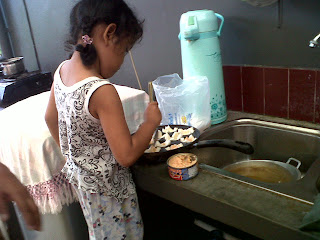Parenting With Love
I have already discussed the importance of reinforcing positivebehavior with our children. This point was driven home even moreupon reading the book, "Parenting With Love" by Glenn I. Latham. He opens his book with this point: "Behavior is Largely a Productof It's Immediate Environment." He goes on to explain, "Simplyput, fix the environment and you will fix the behavior. The firstlesson to be learned by parents is the importance of creating anenvironment in the home that will encourage and reinforceappropriate behavior." (Latham p.1)
He later goes on to state: "Of all the consequences that reinforcethe behavior of children, I have found nothing to be more powerfulthan parental attention. Over the years, as I have worked withfamilies, I have been interested to note that, on average, morethan 95 percent of all appropriate child behavior never receivesany parental attention whatsoever.
It is simply ignored, very muchin harmony with that unfortunate, generations-old caution to 'leavewell enough alone.' On the other hand, parents are five to sixtimes more likely to pay attention to their children when thechildren are behaving inappropriately...""...which behaviors are being reinforced?
The answer is obvious: annoying, inappropriate behaviors. For the most part, ironically,the very behaviors that annoy and concern parents most are the verybehaviors parents are encouraging; hence, those are the behaviorsthat are most likely to reoccur predictably. We have spotted the enemy, and it is us!" (Latham p. 13,14)
Glenn goes on to suggest that "parents have numerous positiveinteractions with their children per hour, interactions that aredelivered intermittently in the form of a touch, a wink, a smile,or a pleasant verbal acknowledgement of what was done that broughtparental attention. It is not unreasonable for parents to aim athaving twenty or more brief, intermittent positive interactions perhour with their children, particularly young children, four to fiveyears old and below. The result will be high rates of appropriatebehavior and few if any inappropriate behaviors." (p.29)
He later goes on to state: "Of all the consequences that reinforcethe behavior of children, I have found nothing to be more powerfulthan parental attention. Over the years, as I have worked withfamilies, I have been interested to note that, on average, morethan 95 percent of all appropriate child behavior never receivesany parental attention whatsoever.
It is simply ignored, very muchin harmony with that unfortunate, generations-old caution to 'leavewell enough alone.' On the other hand, parents are five to sixtimes more likely to pay attention to their children when thechildren are behaving inappropriately...""...which behaviors are being reinforced?
The answer is obvious: annoying, inappropriate behaviors. For the most part, ironically,the very behaviors that annoy and concern parents most are the verybehaviors parents are encouraging; hence, those are the behaviorsthat are most likely to reoccur predictably. We have spotted the enemy, and it is us!" (Latham p. 13,14)
Glenn goes on to suggest that "parents have numerous positiveinteractions with their children per hour, interactions that aredelivered intermittently in the form of a touch, a wink, a smile,or a pleasant verbal acknowledgement of what was done that broughtparental attention. It is not unreasonable for parents to aim athaving twenty or more brief, intermittent positive interactions perhour with their children, particularly young children, four to fiveyears old and below. The result will be high rates of appropriatebehavior and few if any inappropriate behaviors." (p.29)

Komentar